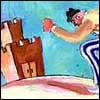Joel Cohen's Question:
It is painfully easy to appreciate the bloodlust a surviving relative will have when an offender kills his next of kin—however unintentionally. American judges will typically show sympathy, albeit largely only in the sentence meted out, to the next of kin criminally charged with killing the offender in hot-blooded vengeance over his horrendous loss.
Still, however unsatisfying the American justice system may sometimes be, it doesn't encourage vengeance—American law doesn't tell the avenging relative that, if a court hasn't yet decided the criminal responsibility of the offender, the avenger is free to actually kill the killer if he hasn't yet arrived at a "City of Refuge."
But, isn't encouragement of vengeance precisely what the City of Refuge system does? By creating a sanctuary to safeguard those who have killed unintentionally, the Torah effectively tells the saddened, but understandably bloodthirsty, grieving relative to quickly kill the killer before he reaches the nearest City of Refuge. This because the Torah tells the avenger that if he does so there will be no reprisal for him under G‑d's law.
Doesn't the American system, then, do a better job of dealing with such a sad episode, discouraging vigilante justice?
Rabbi Adam Mintz Responds:
Joel, you raise two issues in your questions this week:
- The role of the City of Refuge
- The role of the goel hadam (the next of kin, "the avenger of the blood")
First, regarding the City of Refuge, no one should think that it was a luxury resort. The Torah explains that the murderer by accident must run to the City of Refuge and he must remain there until the death of the high priest. In a sense it is a minimum security prison. In essence, the Torah actually punishes the murderer by accident—suggesting that the accident should have been avoided.
The role of the goel hadam is more complicated. How can the Torah not only pardon but actually encourage him to kill the murderer of his relative? Here, I would like to make use of a principle that was introduced by Maimonides in his Guide to the Perplexed. He writes that sometimes the Torah introduced a law as a way of weaning the people off the legal and religious values of the nations that surrounded them.
Here, too, perhaps we can understand the law of the goel hadam by referencing the ancient culture. We know from ancient codes such as Hammurabi that in the ancient world most cultures were based on the principle of personal retaliation. The Torah gives room for personal retaliation by introducing the goel hadam. However, G‑d teaches the people that everything must be tempered by a Torah approach. Therefore, unlike in ancient society where the relative could take revenge as he chose, in the world of the Torah there were limits placed on the rights of retaliation.
But, I admit that this answer is incomplete. According to this theory, why does the Torah prescribe the addition of three Cities of Refuge when Moshiach comes? At that time we certainly will have no need to counter and placate the sensibilities of a Hammurabi-like culture.
I think that that this requires further explanation—for next year...
Rabbi Eli Popack Responds:
First, let's get some laws straight about the goel hadam. True, the goel hadam may kill the murderer if he catches him outside the City of Refuge, but according to many Talmudic opinions, such a murder is only exonerable if the courts have already determined that the victim was indeed the killer—albeit unintentionally. So this is not vigilante justice at all.
Even more important to point out is that the murderer who is consigned to the City of Refuge is not someone whose deed was completely accidentally. Such a person is completely exonerated by the courts, and for the goel hadam to kill him would be a capital crime. The murderer in discussion here was clearly negligent, yet cannot be punished by the courts because it wasn't an intentional crime.
Nevertheless, your question applies: how could we allow a relative to avenge blood if the Torah itself does not prescribe capital punishment?
To answer this question, let's examine the nature of the various penalties and sentences dictated by the Torah.
There are certain grave transgressions that are punishable by karet, "excision." Using the Torah's terminology, "the transgressor's soul will be cut off from her people." The severing of the soul's connection to G‑d also causes premature death. According to Maimonides, this is the worst punishment, for the soul is then cut off from eternal life and does not merit to enter the World to Come.
Another punishment prescribed by the Torah is malkot, lashes. The courts would administer up to thirty-nine lashes to one who intentionally violated certain biblical precepts.
Interestingly, the Mishnah (Makkot 3:15) states that all who are deserving of karet who receive lashes are absolved from karet. The Sages derived this from the verse (Deuteronomy 25:3): "He shall flog him yet he shall not exceed [the prescribed number of lashes], lest . . . your brother be degraded before your eyes." As soon as the defendant receives lashes, he is considered our full-fledged brother.
This tells us that the punishments meted out by the Jewish courts were essentially G‑d's way of sparing the defendants from much greater and harsher consequences.
This concept applies to all punishments administered by the Jewish courts—both for transgressions "between man and G‑d," e.g., desecration of Shabbat, and also for sins that are "between man and man," such as killing or stealing.
We can now clearly differentiate between penalties meted out by the American justice system and those by Torah's justice system, in that the Torah's penalties are not merely deterrents and/or punitive but are primarily intended to provide atonement for the guilty party.
With this in mind we can now understand the Torah's condoning (and even encouraging, see Sifri Massei 2) the avenging of the blood. (The following paragraphs are from the Rebbe's teachings, as adapted by the Gutnick Chumash.)
When the Torah presents the possibility of avenging the blood of the deceased, it is not providing an outlet for man's vicious nature. If the accidental murderer did not deserve the death penalty, the Torah would not permit his execution. Rather, the concept of "avenging the blood" provides a method by which the Torah itself exacts the death penalty.
In other words, the death penalty can be administered in one of three ways:
- Capital punishment which is carried out by the court, with witnesses and a prior warning of the defendant.
- In certain cases, the Torah prescribes a punishment of "death at the hands of Heaven."
- In our case, the death penalty of an accidental murderer is to be administered not by a court, or by Heaven, but by the relatives.
Therefore, even if avenging the blood is optional, it has a logic within the Torah system of atonement, and is not mere personal vengeance.
I'd like to conclude with the following insight:
The halachic authorities write, almost unanimously, that the Torah provision for justice via the goel hadam is contingent on the ability for the case to be addressed by the Jewish courts. Today, as Jewish courts don't judge capital cases, this mitzvah does not apply.
As we don't view the Torah of Truth as in need of "progressive" enhancement, some might say that this is actually a negative development, that we now lack this form of atonement.
I would venture to say that perhaps the opposite is true, that this form of atonement is now unnecessary. Due to our spiritual descent and insensitivity, owing to two thousand years of exile, maybe we are not as liable for our actions as we once were, hence the annulment of capital punishment in Jewish courts, along with the abrogation of the revenge executed by the goel hadam.





